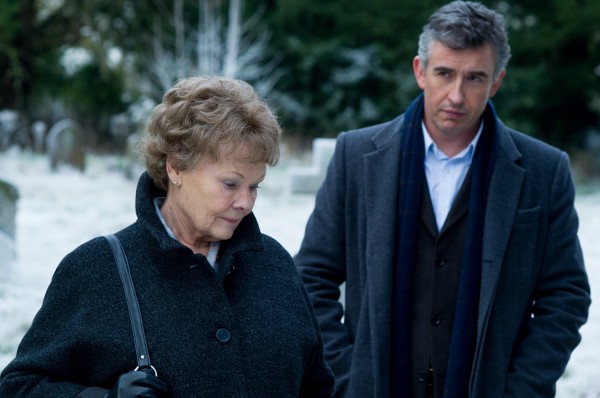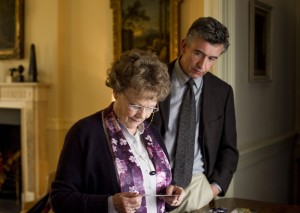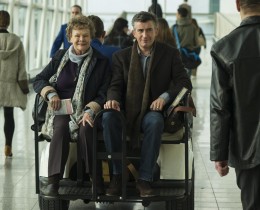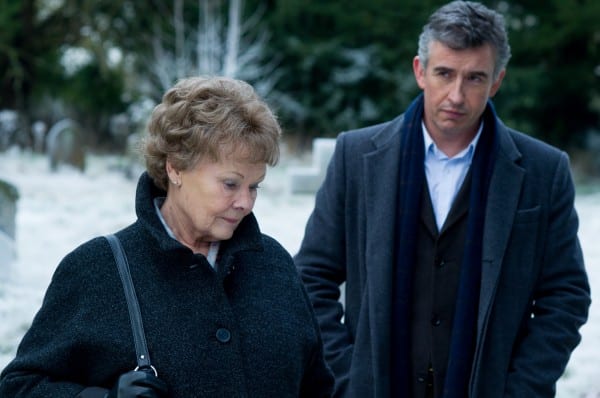
Judi Dench and Steve Coogan in ‘Philomena’
The really unmissible film to see over the Thanksgiving weekend is certainly Philomena. It has everything: Old people (especially an enchanting Judi Dench) for mom and dad; a gay subplot for you; humor, tears and the structure of a detective novel. And it’s all thanks to Steve Coogan.
Coogan is a familiar face whose name you probably don’t know, appearing, as he says, “as Part No. 4 in someone else’s movie.” But the British comedian has also written some funny stuff, including The Trip, which you should check out if you haven’t already.
Coogan co-wrote and co-stars in Philomena, and sat down with us when he was in Dallas earlier this month to talk about how he discovered the true story of BBC reporter Martin Sixsmith and his travels in helping an elderly Irish woman (Dench) find the son she gave up for adoption.
Dallas Voice: How did you find this story? Steve Coogan: I was just treading water [in my acting career], so I was looking for a project that was different for me — and outside comedy, because I wanted to do more nuanced stuff. No one was giving me a break, so I decided to create a break for myself. [I happened upon a magazine article about Philomena], and I thought I could turn it into some kind of drama.
You play Martin, a disgraced BBC reporter who’s quite cynical when he agrees to take on this “human interest profile” and gets transformed by Philomena in unexpected ways. Did you understand him? Yes. They say write what you know about, and I felt a connection to Martin — a liberal intellectual – but I also knew who Philomena was: A working class Irish woman. And her story could have happened to anyone. And I liked the idea of showing that older people were once young people. There were lots of reasons I felt connected to it.
Martin is an atheist, Philomena a devout Catholic, and the film often makes you hate the Catholic church, but never Philomena herself. Half of Martin’s character was me. There are people in my life who are Catholic, and I respect them, and I wanted to dignify ordinary people within the church. She’s a better person than Martin, and she’s Catholic. She seems to be at a better place at the end of the film than he is. I like the idea of people learning. I identify more with Martin’s point of view, but I also see the limitations where you think you’re enlightened and everything else is a load of horseshit. I didn’t want to do any polemical finger wagging at the church because that was already inherent in the film. I didn’t want to repeat [the plot of the film The Magdalene Sisters, which also deals with women like Philomena exploited by the church]. I was more interested in the relationships.
 My favorite line is when Philomena asks Martin, “Isn’t it exhausting being angry all the time?” I put that in because no one has a monopoly on wisdom and all the answers. Whatever my problems with the church and their obfuscation — they behaved appallingly — the forgotten bits are the people who get caught up being tarred with the same brush. There are moral people and diligent people [in the church], and they are the ones who have been let down by the hierarchy. There’s a line that was cut where Marin says, “For an organization that puts so much emphasis on contrition they have to be dragged kicking and screaming to the confessional.” That line got cut, but I’ve said it for you now.
My favorite line is when Philomena asks Martin, “Isn’t it exhausting being angry all the time?” I put that in because no one has a monopoly on wisdom and all the answers. Whatever my problems with the church and their obfuscation — they behaved appallingly — the forgotten bits are the people who get caught up being tarred with the same brush. There are moral people and diligent people [in the church], and they are the ones who have been let down by the hierarchy. There’s a line that was cut where Marin says, “For an organization that puts so much emphasis on contrition they have to be dragged kicking and screaming to the confessional.” That line got cut, but I’ve said it for you now.
Does the screenplay follow the book closely? Martin’s book has very little to do with the film — I wanted to include him as part of the story, so it’s based [more] on interviews. It’s a road movie, an odd couple movie, part detective story, and it explores issues of class, intellect and intuition. Things didn’t happen exactly in the order presented. We withhold bits of information to the end of the movie. But it’s a way of honoring the truth. People want to hear the confrontation with the nuns; it’s important to express that anger.
 The most important scene in the movie is when Martin and Philomena are at an airport, and she’s recounting the plot of a bodice ripper novel she read, and she keeps saying “I never saw that comin’.” Martin is so cynical he can’t even be entertained by that story, and yet that’s exactly the adventure he’s about to go on — the plot twists so many times, you never see anything coming. We had an embarrassment of riches. Some of the things we had to leave out was exploring the life [of Philomena’s son after he was adopted]. We had to pick and choose.
The most important scene in the movie is when Martin and Philomena are at an airport, and she’s recounting the plot of a bodice ripper novel she read, and she keeps saying “I never saw that comin’.” Martin is so cynical he can’t even be entertained by that story, and yet that’s exactly the adventure he’s about to go on — the plot twists so many times, you never see anything coming. We had an embarrassment of riches. Some of the things we had to leave out was exploring the life [of Philomena’s son after he was adopted]. We had to pick and choose.
The structure reminded me of Chinatown: The information was there all along. Martin just didn’t know what he was looking for. Yes. The negative revelation that happens halfway through the film — which I will say that way to protect your readers — I was told that goes against conventions of film structure and had to wait to the end. But I resisted that. Audiences like that. Sometimes if you throw a spanner into the works they say, “Oh I like that — I don’t know what’s gonna happen next.” People are very film literate because there are all these rules about filmmaking. What makes this film work is we don’t adhere strictly to those rules.
Philomena is now playing in wide release.
















